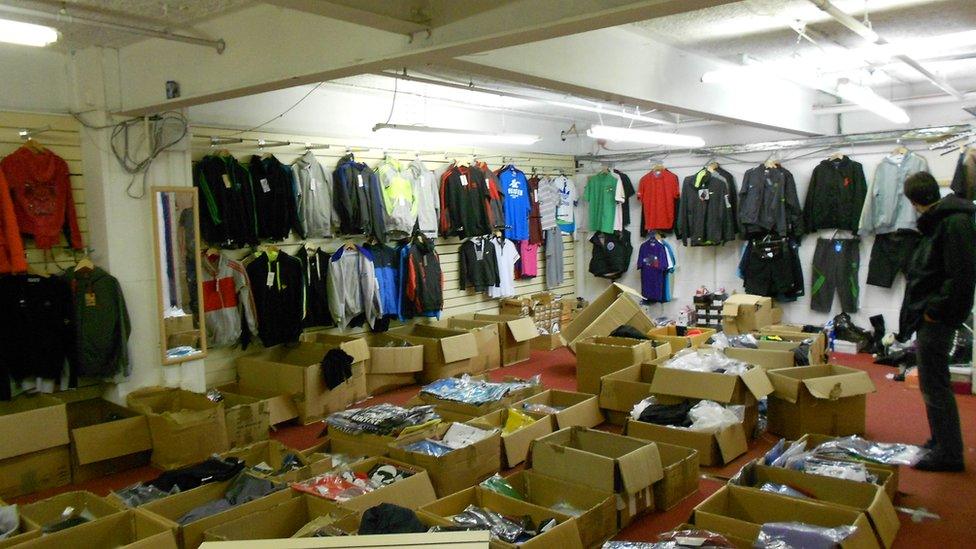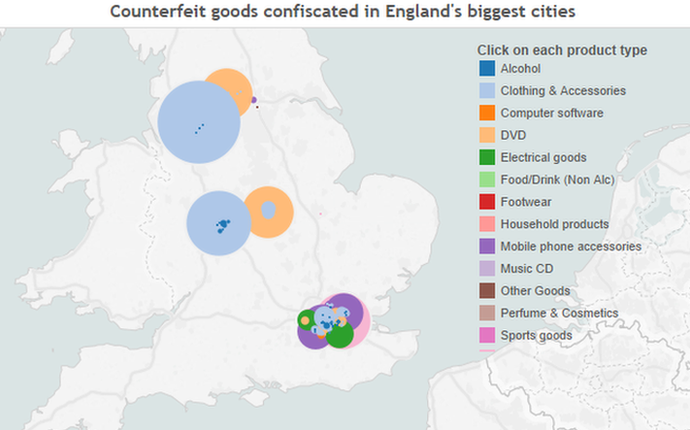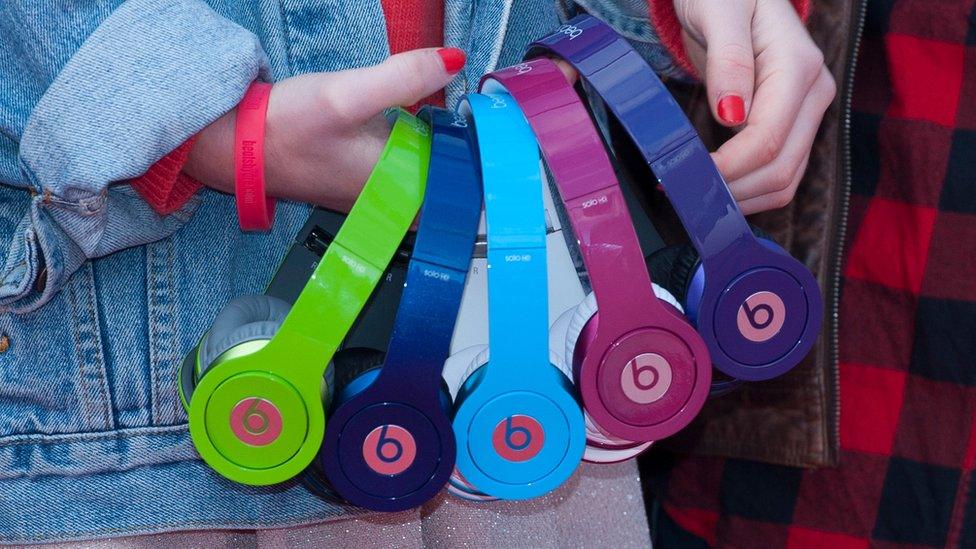England's black market hotspots exposed
- Published

Manchester's Cheetham Hill had the biggest problem with fake designer clothes
The trade in fake goods is putting hundreds of jobs at risk, experts have warned, as a BBC investigation shows the extent of the black market in England's biggest cities.
Trading standards figures showed hotspots in Manchester, Birmingham and Newham in east London.
Commonly copied items included Beats by Dr Dre headphones, branded phone covers and cigarettes.
The Anti-Counterfeiting Group said some fakes were "potentially lethal".
Our investigation revealed:
The Beats headphones endorsed by rap star Dr Dre appeared as one of the most commonly copied goods across England
Fraudsters are copying brand name food, such as chocolate bars, or illegally selling bottles purporting to be well-known shampoos
There was a 76% rise in the number of confiscations between 2014 and 2015
Manchester's Cheetham Hill had the biggest issue with counterfeit clothing, which saw it dubbed Counterfeit Street by the Intellectual Property Office
BBC News asked for records from the 10 most populated cities in England under the Freedom of Information Act. We contacted councils in London, Birmingham, Sheffield, Manchester, Liverpool, Bristol, Leicester and West Yorkshire, where a joint trading standards team covers Leeds, Wakefield and Bradford.
Liverpool City Council and Sheffield were unable to provide a full breakdown and Bristol City Council has yet to respond. London boroughs Westminster, Waltham Forest, Richmond and Merton refused to answer.
Get the data here, external and use our interactive map here, external

Click the link to use the interactive map
Clothing and accessories made up almost a third of all goods seized. The next most common category was mobile phone accessories, with covers often depicting either products, such as the Apple iPhone, or other famous brands.
According to the latest UK Intellectual Property Crime Report, external, the five main countries of origin for counterfeit goods are China, Hong Kong, Pakistan, India and Turkey.
A spokeswoman for the Anti-Counterfeiting Group, external said it was difficult to get a true picture of the scale of the problem because of differences in the way councils record their figures.
However, she said: "We have seen a reduction in anti-counterfeiting activity because of the serious cutbacks trading standards have and still are facing.
"There is definitely a rise in counterfeit items on the UK market.
"We would like to see a change in strategic priorities by recognition of the link between organised crime and counterfeiting.
And she warned that people buying fake goods are putting themselves at risk.
"The criminal gangs that make these products have no regard for health or safety and as such, products are not being tested to the high UK standards and are therefore potentially lethal to the British consumer," she explained.
Leon Livermore, Chartered Trading Standards Institute chief executive, said people did not realise the damage they were doing to legitimate businesses.
"Hundreds of jobs are being lost in sectors that encompass many small businesses, vulnerable to collapse," he said.
"Worryingly, 24% of people have knowingly bought counterfeit goods and a further 21% would consider it to save money."

Beats headphones

More than 6,500 counterfeit Beats headphones were seized since 2013 (real ones pictured)
Since 2013, trading standards in seven of the 10 biggest cities revealed they had seized at least 6,531 sets of headphones or ear buds sold as either Beats or Beats by Dre.
The figure is likely to be even higher as in some cases the headphones were seized among other goods and a breakdown was not available.
Genuine headphones sell for up to £270 a pair.
In one incident alone in the M8 postcode area of Manchester, there were 2,115 fake sets found in May 2014.
Trading standards in Hillingdon in London also found 1,651 sets of counterfeit headphones in February 2013.
Apple, which owns Beats, has been approached for a comment.

Other notable seizures included:
Some 260 phone covers showing Disney's Frozen and a further 230 depicting the Minions from Despicable Me were seized in Enfield, north London
The biggest individual haul of seized clothing was from Manchester's Cheetham Hill. Some 25,600 items of fake clothing including brands such as D&G, Hugo Boss and Ice were seized
Birmingham's team seized 15,693 item of clothing, worth a total of £156,930, in the Lozells area of the city.
The city's Handsworth area emerged as a hotspot for counterfeit tobacco
Counterfeit tobacco was big business in Newham as well. Trading standards confiscated products from the E6 area 33 times in 2013, 12 in 2014 and 25 in 2015.
The highest value item seized in the largest cities was a counterfeit Rolex women's gold watch, said by Royal Borough of Greenwich Council to be a copy of one valued at £39,000.
Manchester's officers found 3,476 packs of counterfeited e-cigarette liquid in Cheetham Hill
Pirated DVDs were also high on the list. Trading standards in West Yorkshire seized 10,000 in one operation in the Lidget Green area of Bradford. Three months later the same quantity was seized in Leicester
Food and drink was also copied. In 2013 631 chocolate bars falsely labelled Wonka were seized in the Ancoats and Northern Quarter area of Manchester and 85 more were confiscated in Croydon the same year
In a report on the counterfeit trade in Cheetham Hill in January 2016, Baroness Neville-Rolfe, minister for intellectual property, said: "This trade, where income tax and consumer safety is simply ignored, undercuts and undermines legitimate businesses and allows other criminality to be funded and flourish."